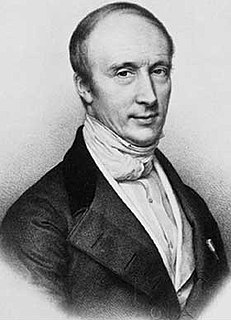A Quote by Carl Friedrich Gauss
By explanation the scientist understands nothing except the reduction to the least and simplest basic laws possible, beyond which he cannot go, but must plainly demand them; from them however he deduces the phenomena absolutely completely as necessary.
Related Quotes
It is one thing for the human mind to extract from the phenomena of nature the laws which it has itself put into them; it may be a far harder thing to extract laws over which it has no control. It is even possible that laws which have not their origin in the mind may be irrational, and we can never succeed in formulating them.
The laws of Nature, that is to say the laws of God, plainly made every human being a law unto himself, we must steadfastly refuse to obey those laws, and we must as steadfastly stand by the conventions which ignore them, since the statutes furnish us peace, fairly good government, and stability, and therefore are better for us than the laws of God, which would soon plunge us into confusion and disorder and anarchy if we should adopt them.
First, it is necessary to study the facts, to multiply the number of observations, and then later to search for formulas that connect them so as thus to discern the particular laws governing a certain class of phenomena. In general, it is not until after these particular laws have been established that one can expect to discover and articulate the more general laws that complete theories by bringing a multitude of apparently very diverse phenomena together under a single governing principle.
The scientist is not responsible for the laws of nature. It is his job to find out how these laws operate. It is the scientist's job to find the ways in which these laws can serve the human will. However, it is not the scientist's job to determine whether a hydrogen bomb should be constructed, whether it should be used, or how it should be used. This responsibility rests with the American people and with their chosen representatives.
A very wise father once remarked, that in the government of his children, he forbid as few things as possible; a wise legislature would do the same. It is folly to make laws on subjects beyond human prerogative, knowing that in the very nature of things they must be set aside. To make laws that man cannot and will not obey, serves to bring all law into contempt. It is very important in a republic, that the people should respect the laws, for if we throw them to the winds, what becomes of civil government?
Train yourselves. Don't wait to be fed knowledge out of a book. Get out and seek it. Make explorations. Do your own research work. Train your hands and your mind. Become curious. Invent your own problems and solve them. You can see things going on all about you. Inquire into them. Seek out answers to your own questions. There are many phenomena going on in nature the explanation of which cannot be found in books. Find out why these phenomena take place. Information a boy gets by himself is enormously more valuable than that which is taught to him in school.
For the powers of our mind, life, and body are bound to their own limitations, and however high they may rise or however widely expand, they cannot rise beyond them. But still, mental man can open to what is beyond him and call down a Supramental Light, Truth, and Power to work in him and do what the mind cannot do. If mind cannot by effort become what is beyond mind, Supermind can descend and transform mind into its own substance.
My propositions serve as elucidations in the following way: anyone who understands me eventually recognizes them as nonsensical, when he has used them--as steps--to climb up beyond them. (He must, so to speak, throw away the ladder after he has climbed up it.) He must transcend these propositions, and then he will see the whole world aright.
To develop an empiricist account of science is to depict it as involving a search for truth only about the empirical world, aboutwhat is actual and observable.... It must involve throughout a resolute rejection of the demand for an explanation of the regularities in the observable course of nature, by means of truths concerning a reality beyond what is actual and observable, as a demand which plays no role in the scientific enterprise.
The chief point we must remember is that the great and rapid advance of the physical sciences took place in fields where it proved that explanation and prediction could be based on laws which accounted for the observed phenomena as functions of comparatively few variables - either particular facts or relative frequencies of events.







































